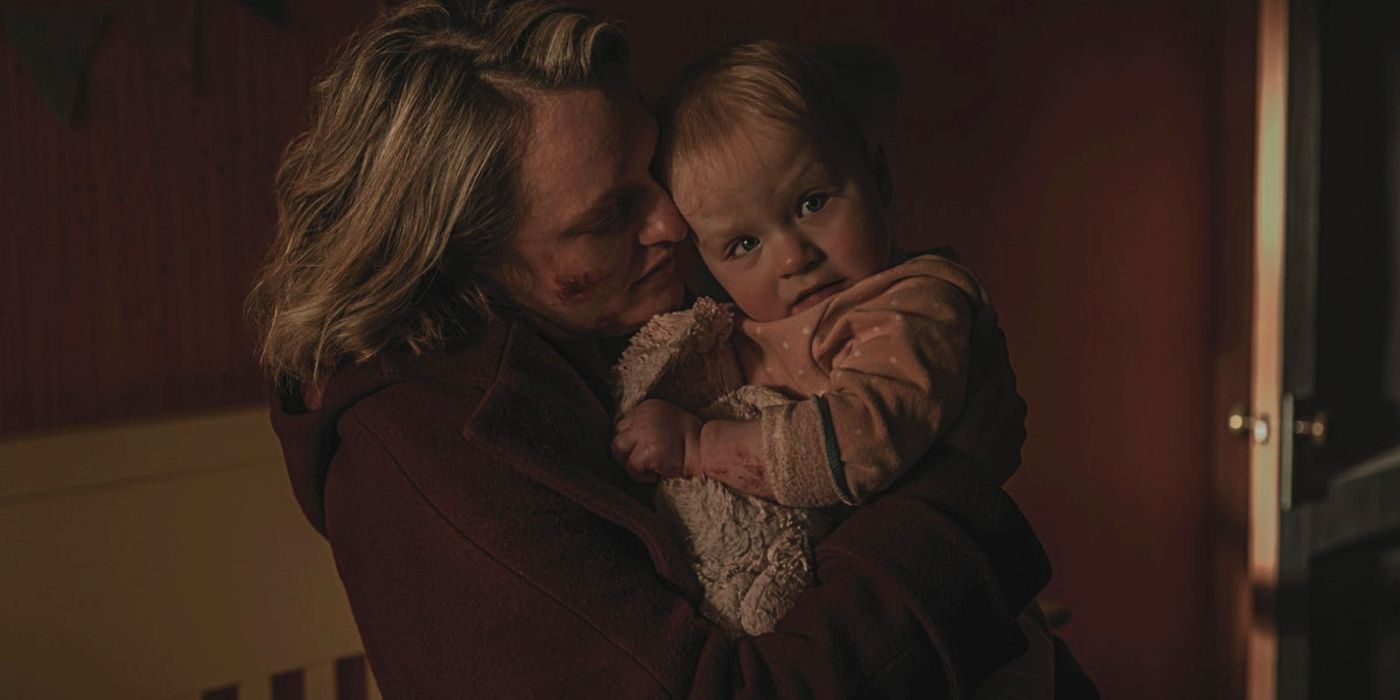
Warning: Contains SPOILERS for The Handmaid's Tale season 4, episode 10.
The Handmaid's Tale season 4 ends with June Osborne killing Fred Waterford; here's everything that happens to reach that point, and what it means. The Handmaid's Tale season 4 has been one of change. While the show initially seemed to be trapped in a cycle of repetitive storytelling and graphic violence, it was able to break free of that rigid structure with one of its biggest moves yet: June's escape from Gilead into Canada, which flipped the show on its head.
For so long, June had been fighting to survive within Gilead, but now she was given a chance to do much more. She can live her life, while continuing to fight not only for her own survival, but for justice. That, however, is not an easy thing to come by, as June learned in The Handmaid's Tale season 4, episode 9,"Progress," when the United States struck a deal to work with Fred against Gilead. June, of course, was never going to just let that happen, though it wasn't immediately obvious just what that entailed.
The Handmaid's Tale season 4 finale deals with the fallout of that decision, and June's attempts to reverse it. Pulling in favors from just about everyone she knows, June does whatever it takes in order to stop Fred from becoming a free man, and to get if not justice, then at least revenge. It makes for an ending that's shocking, emotional, and satisfying, with plenty to unpack and lots that will leave its mark on the show until its very end.

The death of Fred Waterford is one of The Handmaid's Tale's biggest ever moments, but it's one that's been a long time coming. As one of the architects of Gilead and the principal abuser of June (and countless other women thanks to the regime he helped create), then his being killed is a development that has long seemed deserved. It connects to how much damage Gilead has caused, and the lingering impact upon June and others that the Commanders have. Fred committed atrocities and could not be let off the hook, which is what Mark Tuello and the United States initially intended to let happen, and so June had to take matters into her own hands.
June could have simply allowed for Gilead to take Fred back, which is what the deal with Commander Lawrence setup. Fred had given away Gilead secrets, he had betrayed the Republic, and so he would have been put on trial as a traitor to his country, which at the very least would've meant being confined to a prison cell, if not his death. But Lawrence himself told June that it wouldn't be enough. That no matter what Gilead did, it would never be enough. Since arriving in Canada, June has struggled with a rage that has threatened to consume her, and it stems from the actions of the Waterfords. Because of the trauma they have caused, then June believes she cannot be free while Fred is still alive. As she tells Emily, she needs him to know the fear that he made her suffer, which is why she not only has to kill him, but do so in the manner she does, having him chased by a group of former Handmaids and brutally murdered by them (which itself calls back to the Particicution ceremonies of Gilead, but puts the women fully in control - doing their bidding, not that of other men).
For the other Handmaids, too, this is a sense of catharsis. Waterford may not have been their Commander, but they all had one just like him. To Emily and the others, this is revenge not only for June, who has already become their leader, but vengeance for everything they and all the rest of Gilead's Handmaids, Marthas, and everyone else had to survive. Even then, Fred only suffered a fraction of what they did, given how quickly it was over - unlike June, he did not spend years being tormented. Morally, it's easy to wonder whether June went too far, a question The Handmaid's Tale season 4 has already raised a few times. It's uncomfortable viewing, and deliberately so. But, given her trauma and not being able to trust the legal processes on either side of the border to deliver the justice and peace necessary, it's apparent that killing Fred was the only choice June could make.

June's role in Fred's death is clear, but what about Gilead's? The motivations of the regime, and in particular Commander Lawrence, are once again a little harder to parse. Gilead could have had its once prodigal son returned home, and many would likely believe that Fred was theirs to decide what to do with, and that he ought to face trial in the country. Fred won't necessarily be missed - it was already revealed that Gilead had given up on the Waterfords anyway - but the decision made by Lawrence is an interesting one. His character motivations have long been unclear: he is, seemingly, a decent person who regrets what Gilead became, but who has not fully committed to turning against it or bringing it down. Even this doesn't completely spell things out, because he seemingly does it more out of loyalty to June than as part of a great Gileadan plot. Whether the other powers-that-be of Gilead were aware isn't revealed, but given Lawrence himself has to pretend to be surprised at Nick and the Eyes taking Fred away, then it's likely this wasn't part of the "plan" as they knew it. For Gilead, Fred's death may not change much: he was of no use to the country, and it means he can no longer spill anymore secrets, so it's perhaps a welcome course of action.
Nick's role in things is more straightforward. The character has often been torn between his love for June and his duty to Gilead - essentially, split between "Nick" and "Commander Blaine" - and he hasn't always made the right call, such as bombing Chicago when June was there. Here, though, he makes a choice to stand with June, and to use his power and influence in Gilead to help her get exactly what she wants. The kiss between Nick and June solidifies that he'll do whatever he can to help her because his love does outweigh what he owes Gilead, but it remains to be seen what the future holds. That kiss could also be seen as a parting between them, but with June's own future unclear, then it's not impossible she and Nick will meet again somehow.

June's fate and future is left deliberately ambiguous in The Handmaid's Tale season 4 finale, but the final scene she has suggests that killing Fred Waterford has come at an extremely high cost. She spends time with Nichole in her bedroom, when she's encountered by Luke, looking like a broken shell. June explains she is just having five minutes with her daughter and then she'll go, but it's not explained what that means. Is June being punished for killing Fred? It is possible that she will eventually be, but since the death occurred in No Man's Land, then there's no obvious jurisdiction for a murder charge. Showrunner Bruce Miller told Variety that people don't know about Fred's death yet, so she isn't being arrested right now.
Nonetheless, it seems this is what breaks June and Luke apart, at least for now. Ever since June arrived in Canada, they have attempted to reconnect as a couple, but things have never quite clicked. Luke has been frustrated in his inability to understand what June went through, and she has been overcome by her own anger, which has sometimes been directed at him. Even without murdering Fred, their road ahead was complicated. But now that June has killed someone, and done so as a calculated act of vengeance, then that is something Luke may be struggling to deal with (and understandably so).
It wouldn't be too much of a surprise if he wanted her nowhere near himself or their daughter, believing her too dangerous and needing to live with herself before she can live with them. June and Luke's future will still be entwined in some way - they have Nichole, and Hannah remains in Gilead - so they will have to come back together eventually, but whether they can ever repair that bond and be a married couple again is left in serious doubt. For June herself, the decision also harks back to her conversation with Emily earlier in the episode, where she discussed having to let go of Nichole to be a good mother. Emily very pointedly did not correct her, and June has reached a point of self-realization, knowing that the best thing for herself, Nichole, and Luke is time and space because she still has so much she is learning to come to terms with.

While the fate of one Waterford is forever sealed, the other remains much more uncertain. Serena Joy is left waiting in Canada for a Zoom call that is never going to happen (and one that she seemingly doesn't really want), but what will now become of her? Serena remains a prisoner, and her best chance at freedom - with Fred's testimony in Geneva - has been killed. It's possible that she could simply be jailed permanently, which her crimes would be deserving of, but it's possible she could still strike a deal. The US and Canada may have lost Fred, but Serena can also provide a lot of evidence about the inner workings of Gilead, something she'd ordinarily have no qualms about doing.
That she has been sent her husband's finger - and wedding ring - is something of a warning though. June reacted the way she did because Fred was going to escape justice, and the message that sends is Serena will not be allowed to try and pursue a similar opportunity. Whether that means Serena will also be killed remains to be seen: June has enough hatred to do so, but it's also hard to imagine her killing another Waterford. There's also the fact that people in Canada cheered for the Waterfords: if Serena plays up to Fred's death, committing herself to being his widow and a woman who has suffered tragic loss, then she may be looked upon more favorably, at the very least adding to her celebrity. That could help her cause, but even still her chances of escape and freedom with her baby are that much more complicated now.

The final shot of The Handmaid's Tale season 4 delivers on June's promise to put Fred on the wall, with a shot of him hanging next to the message "Nolite Te Bastardes Carborundorum." It's one that will be familiar to any reader of Margaret Atwood's The Handmaid's Tale book, and roughly translates to "Don't let the bastards grind you down." It's a message that's at the very core of The Handmaid's Tale's story (and was used back in season 2 of the show, when June wrote it on a wall in the Waterfords' house). In the book, June originally used it as a prayer, before discovering its true meaning; in both versions, the phrase connects to Fred, who also used it in the past. Fred using it gave the quote a strange feeling; it is one of encouragement to the women in Gilead (and in real life, too), but he is the abuser, not the abused. By using it next to his dead body, then June and The Handmaid's Tale brings things full circle, reclaiming the phrase from Fred Waterford, no longer letting the bastards grind them down.

With The Handmaid's Tale already renewed for season 5, then much of what happens in the finale will have a major impact upon the next run of episodes. Certainly, the fallout from June's actions will be significant: has she crossed the line? Did her anger go too far? Will she be punished? These are all questions June will have to face, both in a very introspective sense as she reckons with the kind of person she is and wants to be, and in a legal sense too. Fred's death will have big reverberations, and that should be witnessed in Gilead and in Canada, in particular what it means for characters such as Commander Lawrence and Serena Joy. And not only does June's trauma need to be explored further, but so does that of all the other women in the story, such as Emily, Rita, and Moira. The Handmaid's Tale season 4 doesn't offer any sense of closure on those (if closure is achievable), and those threads have to be continued.
There's also the characters that The Handmaid's Tale season 4 finale didn't feature, most notably Aunt Lydia and Janine. As the latter continues to serve the former, and is withheld from duties as a Handmaid, then it will be fascinating (if potentially grim) to see how that unfolds. Lydia may have plans for Janine beyond being a Handmaid, perhaps even wishing for her to become an Aunt. As Lydia will eventually turn against Gilead in a way, at least if the show does setup and lead into The Testaments (Atwood's sequel novel), then what happens to Janine could be a decisive factor in that. The Handmaid's Tale felt stale at the beginning of season 4, but June arriving in Canada, and now the death of Fred, have given it what feels like a new lease of life, with many possibilities for season 5.
from ScreenRant - Feed https://ift.tt/2S0bJ6I



0 Comments